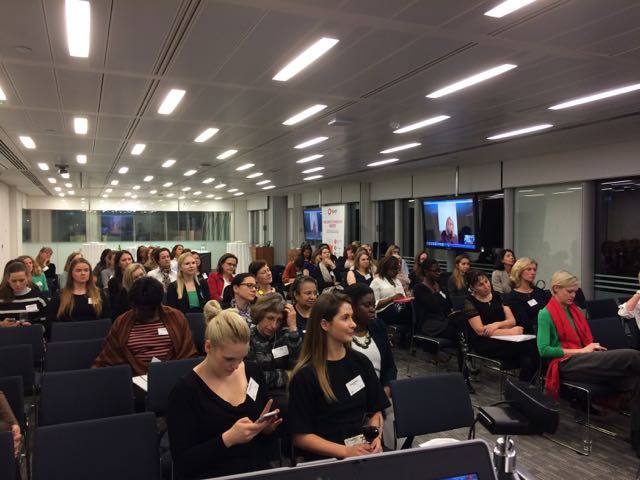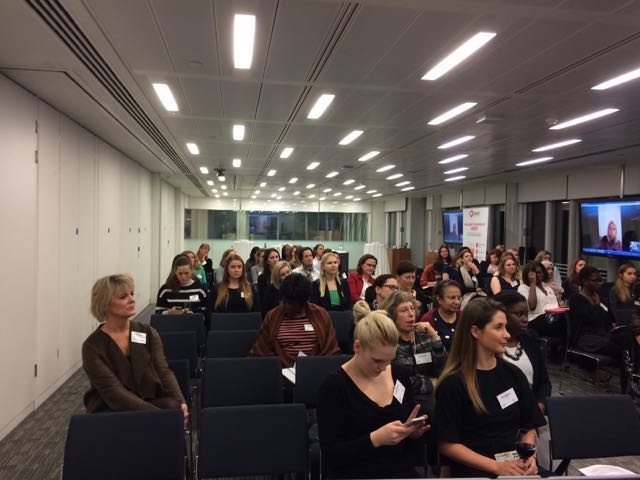Lessons from Leading Women Tech Entrepreneurs – 2016
WiTT hosted its annual women tech entrepreneur panel session, as part of Global Entrepreneurship Week, on 16th November; the event was kindly sponsored by DLA Piper at their London offices. The panel comprised Jess Butcher, Co-Founder of Blippar, Tania Boler, Co-Founder and CEO of Chiaro and Barbara Spurrier, Founder and CEO of CFPro. Audrey Mandela took the chair.
Each panel member briefly described her business and her journey to becoming a successful entrepreneur.
Jess’s business, Blippar, was founded five years ago and now has 300 people and 14 international offices. The company’s mission is to shift behaviour around search to a more visual one and it is leading in this field. The company has received £100 million in venture funding to date. If Jess and her team are successful, “to blip” will join “to tweet” and “to google” in the English dictionary before long.
Tania’s business, Chiaro, is focused on the application of technology, particularly wearables, to women’s everyday health issues. Her first product, Elvie, assists with pelvic floor exercises and has already generated significant interest. The idea for Elvie came when Tania’s gynaecologist told her that a key issue for women post pregnancy is ensuring that the pelvic floor remains strong. Tania is now finalizing her Series A round of VC financing and sees the enormous opportunity for her products.
Barbara’s business offers outsourced accounting, pre-IPO support, and pre- and post-IPO financial advice and assistance to small and medium companies. In her role as an interim finance director, Barbara has recently successfully completed a reverse takeover of a cash shell for a personal mobile health sector company.

Tania Boler, Chiaro, far end of the table, speaking; Barbara Spurrier, CF Pro;
and Jess Butcher, Blippar, on the screen
The panel’s introduction was followed by an extensive and highly informative Q&A which provided honest and practical advice and experiences.
Q1 – Each panellist was asked what were the main challenges that they faced as an entrepreneur?
Jess: One of the key challenges was at the beginning, having the courage to take the leap and leave the safety blanket of employment behind. I had to focus on trying to de-risk on a personal basis, but everyone needs to assess their own personal position on risk.
Other challenges included:
- the ability to stay true to the original idea and not deviate
- the difficulty in knowing what is working and what is not
- the issue of wanting to be liked by everyone even though you are the boss
- hiring and firing, I had to toughen up
- hiring “doers” instead of good managers.
Tania: A key challenge for me was being in tech when I was not a technologist or engineer myself – who should I listen to? Having a co-founder whom I could really trust was a key for me.
Other challenges included:
- Building a team that was really behind the vision I had for the company
- Self confidence!
- Being an entrepreneur is like running a marathon in 100m sprints and having the stamina to continue can be a real challenge at times.
- It can also be very binary: you either run out of money or you change the world!
- Making personal sacrifices and having children.
Barbara: One of the challenges for me was not having a mentor or anyone I felt that I could talk to, or talk ideas through with. Things have changed in this regard and it is something I would recommend that you seek out.
Other challenges highlighted:
- Confidence – aim high, particularly in the early days
- Team building and recruitment always present significant challenges.
Q2 – Each panellist was asked to tell us what her worst and best decisions were.
Tania: The best decision I made was not to rush into finding a co-founder.
The worst decision I made was in the beginning to think I had to understand everything myself, e.g., digital marketing, and not to look for others to assist.
Jess: My best decision was to start the business!! I was also lucky in that I found the right co-founder. I am a historian by background and so finding someone who could do Augmented Reality was absolutely vital.
My worst decisions were always around not recognizing quickly enough that things were not working out, whether that was direction of travel, people or territories. It is a waste of resource not to sort these things out immediately.
Barbara: The best decision I made was to move my business to London where the majority of my business is, particular now we focus so strongly on pre-IPO work. I also now have a Number 2 who I can really rely on.
The worst decision was to take money from the wrong investors when we wanted to get into outsourced cloud-based systems. You need to move very carefully when seeking money from friends.

Q3 – What are the key issues when attempting to scale-up your business?
Barbara: From the various businesses that we have advised over the years I see the key issues as:
- Firstly, choose the right stage to scale up, particularly if that involves an IPO. Don’t try to do this too early. Many entrepreneurs think that the market will take them through a journey, but that is not right.
- Secondly, in order to scale up an entrepreneur needs to build the right team around her, otherwise it will not work as the company grows.
Tania: We are just about to complete our A-round funding. It has been key for us to ensure that we have our culture, processes, values, and systems in place for this. Recruitment is a key issue in terms of scaling up and it is really difficult to find good tech women, who I really want to bring on board in my company.
For our next stage of scale up I may need to go to find a corporate venture partner who can bring different strategic strengths to the company.
Jess: The key things to think about in terms of scale-up are:
- The cultural divide between the UK and the US, particularly Silicon Valley. I am always being told that I am too deferential when I am in the US!
- Think big — the UK is good at start-ups but not at scale-ups. Too many people are content with making £5-50m! because of this you will probably need to look outside the UK for inspiration
- Cultural cohesion is key.
- The team and building that team is crucial to provide the structures necessary for scale up.
- If you want very specific expertise don’t be afraid to go outside the UK for it. We do almost all our R&D on the West Coast of the US because that is where the experienced talent is to be found.
- Make clear decisions about your internationalization, where when and how. We want to become part of the English language so we need to expand first into English-speaking countries.
Q4 – When you were looking for investment, were you treated differently because you were women?
Tania: No, I did not find any specific gender bias. However, whether you are a male or female you need to know your numbers and work hard to get the right investors on board.
Jess: I have three male co-founders who have taken the lead on fund-raising so I am not in a good position to answer the question from a personal point of view. However I do know that it has been a challenge for others. There are few women angels although there is a women angels’ network called Angel Academe run by Sarah Turner. Very few VCs are women and until that changes, it will probably be more of a struggle for women. It is also my view that women are naturally more risk-averse and this creeps into the statements they make and the claims they make about their businesses which in turn can makes them less attractive to the VC community.
Barbara: In my experience fund raising, whether it be via the VC community or via an IPO, is more challenging for women and I am struggling to think of a recent woman-led IPO. I believe that this is changing as we get more female role models running businesses, but it is a cultural/generational thing.

Q5. A question specifically for Tania – did you find that women’s health issue were not understood by the investor community ?
Tania: The main group that we have difficulty with is young males who generally don’t get it. Otherwise it is a question of finding the right approach. For example I was talking to a group of middle-aged men who, to start with didn’t really understand, but then when I asked them whether their wives had had difficulties post childbirth with prolapse, etc., they all realized why the product could be relevant.
Q5: What single piece of advice would you give a budding entrepreneur?
Barbara: Go for it, be confident, aspire higher and find a mentor.
Tania: Be courageous, it will be longer and harder than you think. Have a big risk appetite but plan for the worst case.
Jess: Formal mentoring often doesn’t work but you need to find your “tribe”. Those 30 or 40 people (not only women) whom you can go to for advice from time to time. People who have built businesses or have experiences that could be useful. Sometimes just having a coffee or a lunch can be of enormous benefit in thinking something through or just having a shoulder to cry on. Use technology for this as well – I have a WhatsApp group who I am in regular contact with to exchange information on things like term sheets, HR issues, professional services and even personal issues of one kind or another!
